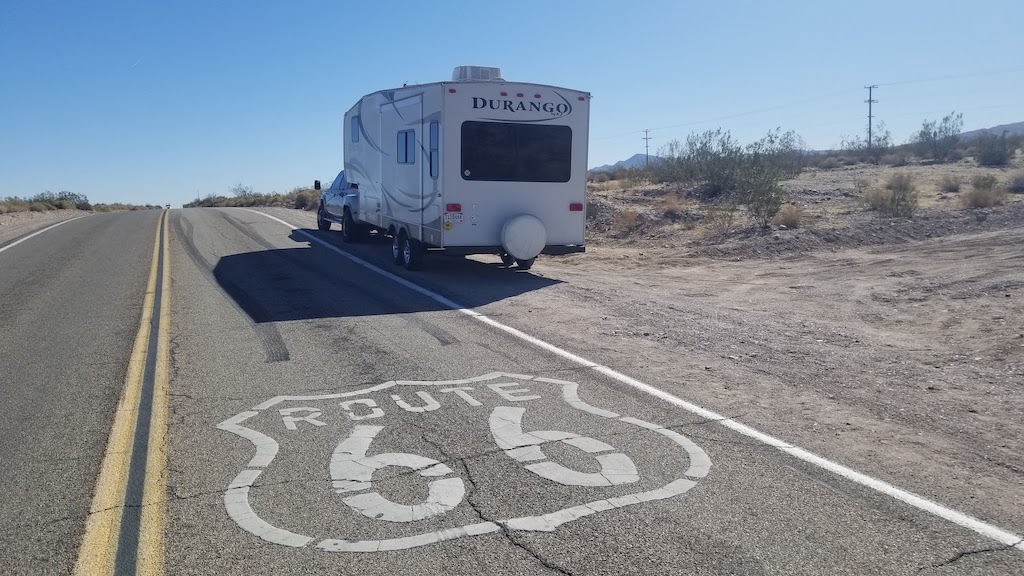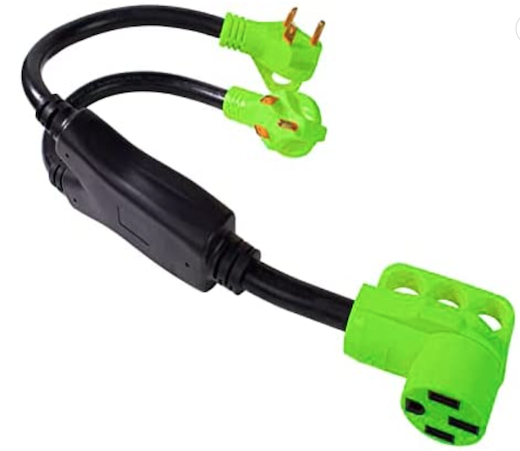Today, we are looking at some RV accessories that are absolute “must haves” for our travels in our RV to make sure we are safe and comfortable in our adventures.
1) Which RV Water Filter System is right for my RV?
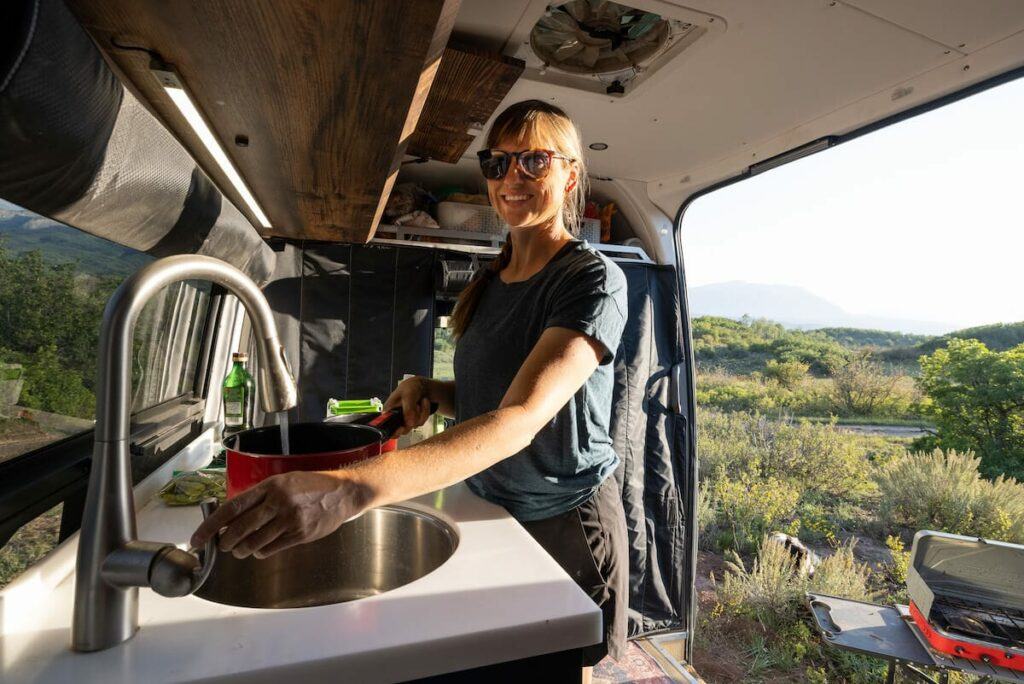
Clean and safe drinking water while you are camping in your RV is imperative to you and your family’s health. Clean, bacteria free water tastes better, and that means you and your family will drink more, which is a huge benefit to your health and wellbeing. A good supply of drinking water will make you feel cool and refreshed with every glass.
Water quality is also important for your RV’s plumbing and water heater. Sediment, rust, calcium, and lime contribute to blockages and general decaying of pipes, fittings, faucets, valves, and your water heater. Any kind of filtration system will reduce these risks, making it imperative to at least have the minimum filtration available. The more sophisticated the water filter, the better the protection of your RV’s water system and the better the taste!
There are a few hidden benefits when purchasing an RV water filter. Having a water filter will save you from filling up containers at filtration stations, or buying water from stores. Sure, you could use tablets in your water tank, but really an RV water filter system is the most convenient option if you’re planning to use your RV regularly.
There are many different types of water filter systems and brands on the market, but it really breaks down to two types: permanently installed, or portable.
We use a portable sediment water filter at the hose connection outside our RV. This is one of the simplest kinds of filters, and the cheapest. SEDIMENT FILTERS are used to filter out dirt particles and some organic matter which will remove larger sediment granules like sand and dirt, and reduce calcium and lime deposits in your faucets and shower. Particulates and minerals can get into your faucets eventually causing annoying drips through the night.
If you have the space, the top of the line reverse osmosis water filter is the best you could have. This type of filter would be used just for drinking water. The process for reverse osmosis filtration is slower, so it is not suited for the shower and water basins. A reverse osmosis type water filter should have a single drinking water outlet beside the regular faucet at your RV’s kitchen sink.
The APEC Water Systems Top Tier Supreme Certified Alkaline Mineral pH+ High Flow 90 GPD 6-Stage Ultra Safe Reverse Osmosis Drinking Water Filter offers the optimum in taste and purity, but remember, this type of water filter may be too bulky for many RVs.
Here’s what Amazon reviewers say about the APEC Top Tier … ‘easy to install, great tasting water!’ … ‘works as intended’ … ‘I’ve been a happy owner of one of these systems for 5 years now. Order it now!’
Can you install a reverse osmosis water filter system in your small RV? The short answer is: Yes! But you may have space limitations if your own a smaller RV or motorhome. The osmosis system could be installed in a cargo hold or under a seat or bed if there is no room under the sink. Some RVs and travel trailers have large voids behind the TV or behind an electric fireplace. Larger fifth wheels have plenty of space in cargo bays, while many Class A motorhomes have storage bays below the floor that could accommodate a complex reverse osmosis system.
Does the system have to be designed especially for RVs? No, it can be a household water filtration system. Just remember the restrictions of size and weight. If your RV load is usually at the maximum, you may have to leave the icemaker behind to accommodate the extra weight. You just cannot take everything on your camping trip or RV excursion.
To get you started, follow the links to Amazon for some simple filtration options we recommend.
Alan’s Tech Notes:
I was parked at a ranch house for an extended period. The water was supplied from a well and connected to the ‘city water’ inlet of the fifthwheel. After a few months the hot water in the shower started to smell sulphurous. Each shower was smelling stronger, but the smell would go away after a minute or so. I cooled the water heater, released the water pressure, and checked the anode rod. (Most Dometic brand water heaters do not have an anode rod. The Suburban brand RV water heaters do have an anode rod.) The rod was totally dissolved and needed replacement. I flushed the tank, added a basic water filter to reduce the mineral content and now with the new anode rod, the water was back to neutral odour.
Please note, this advice is general in nature and we strongly recommend consulting the product manual and where relevant, a professional installer, especially if your RV is still covered by the factory warranty.
2) Why Your RV Needs a Water Pressure Regulator
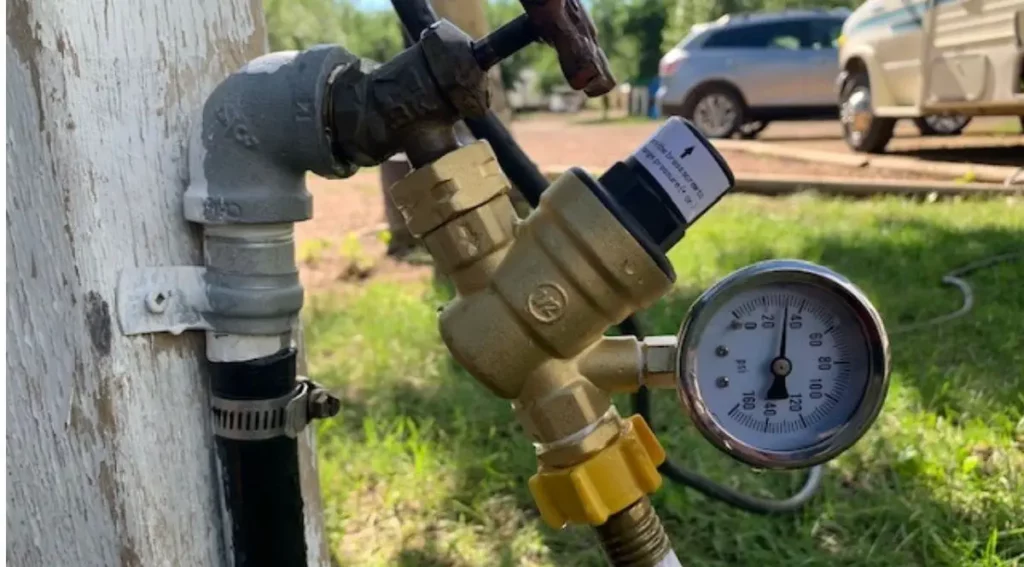
While an RV water pressure regulator doesn’t actually filter your water, it is still a very important part of your RV water filtration system. You never know what the campground’s water pressure will be and you need to protect your RV from extremely high water pressure or you risk damaging your RV’s plumbing system and filtration system. Without a water pressure regulator, your RV’s plumbing could spring a leak with excessive water pressure and you are risking damage to your hose, seals, fittings, and the plastic pipes running throughout your RV.
Alan’s Tech Notes:
I met a customer who had a water leak behind the toilet in the bathroom. I repaired the leak and just before running the water I asked the owner if he uses a regulator.
“No need”, he said, “the water pressure at my spigot is perfect for RVs, just enough pressure not too strong.”
I trusted his advice and turned the water on. With a loud burst and the sound of water rushing, the plumbing broke, but in a different location, under the sink this time. Easy fix, I thought, just another cut and splice with a new union in the pipes. Switched on the water again, and boom! Another split in the pipes, more water to clean up and this time, the pipes broke in a really concealed location. It took a lot of work to replace the plumbing deep behind a wall. After this last failure, I became suspicious of this water pressure and added my own water pressure regulator I had stored in my spare-parts stock in my truck. Now there were no more leaks! This customer now has a water regulator permanently fitted at his home spigot and a newly repaired RV plumbing system.
The RV water pressure regulator we recommend is inexpensive, easy to install, and reliable. It lowers water pressure to a safe 40-50 psi and is compatible with standard garden hose threads. As it is made from brass, it is lead free and suitable for most city-water water hookups.
You simply attach this to your water hose and to the city water inlet on your RV and you will have peace of mind that your RV filtration and plumbing will be safe from damage and potentially costly repairs.
Can you get by without a water regulator?
Yes, there are ways to safely connect to any water supply without a water pressure regulator. When we hooked up in our early days of traveling, we would open up the outdoor shower which in most campgrounds is close to the campground spigot. Take out the outdoor shower head and fully open the cold water valve on the shower faucet. I would then open the campground spigot just enough to get a trickle of water from the outdoor shower head. Then very slowly open the spigot just enough to see a stronger and useful amount of water spraying from the outdoor shower head. Don’t make the flow bursting out of the outdoor shower, but half way between bursting water flow and a weak flow. This will be just right for your RV’s plumbing, but on use this method as a guideline, not as a guaranteed safe method because the campground pressure could surge.
3) RV Electrical Surge Protectors
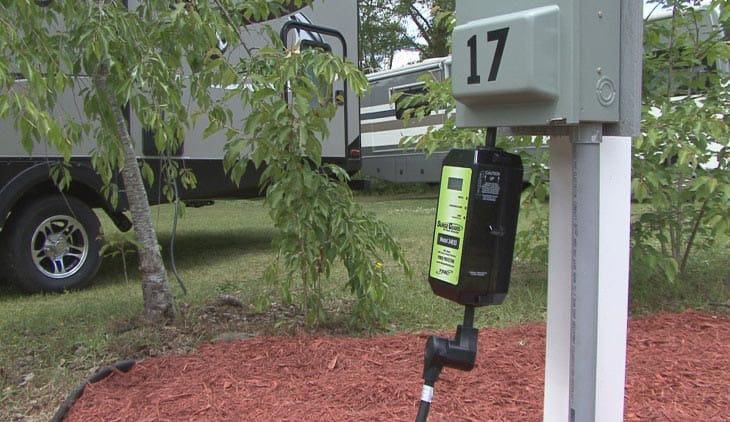
Just like the RV water pressure regulator, your RV is also subjected to damaging electrical surges (voltage spikes). Plugging your RV into unknown power sources like those at campgrounds is always risky. You never know if a power pedestal has issues that even the park owner isn’t aware of yet. An electrical surge can damage RV electronics, appliances and anything plugged into a 120V AC outlet such as your TV so having a RV surge protector is an absolute must.
Any interruption in the power grid is capable of causing a power surge or spike in electricity. Power surges occur when the flow of electricity is interrupted, then started again, or when something sends electricity flowing back into the system. This could happen when lightning strikes a power line, or an outage in the campground, electrical overload, or faulty wiring, for instance.
Alan’s Tech Notes:
I was called to investigate a fifthwheel RV where the airconditioner and fridge had stopped working. There was also a portable fan plugged into a wall socket that had suddenly began running at a slower than normal speed. I checked the campground power at the pedestal and it showed around 120 volts. That’s good. I went inside and the outlets only showed 87 volts. That’s not good, and it explained why the portable fan was running so weak. The fault was eventually found in the campground pedestal. A wire was partially severed. This would give 120 volts on a test meter, but when any kind of heavy load like airconditioning was applied, the voltage was so low, it burned the motor windings of the airconditioner, and ruined the heating element in the fridge. This was a costly repair bill! The low voltage also ruined the electrical panel and thousands of dollars went towards a new airconditioner, a new circuit board switch panel, some burned electrical wiring, and the fridge element. This owner did not have a surge protector which would have everything. It was a huge inconvenience to this poor RV owner, but thankfully her insurance covered most of that bill!
We have found the Smart RV Surge Protector with Waterproof Cover All-in-1 Circuit Analyzer Power Guard to be very reliable over our many years of use. It is easy to use, weather proof and great value for the money.
4) Electrical Shore Power Cord Adaptors 30/50 or 50/30
Can you use a 50 amp campground outlet in a 30 amp RV?
Wow! This question really put us in a quandary. We were heading to a new RV park somewhere in the midwest of the USA when we noticed that they only had 50 amp sites remaining. Will this blow our RV’s circuits? We quickly searched online to find all sorts of warnings and stories of ruined wiring causing thousands of dollars damage to an RV. Other stories said the RV was written off from the damage. While other stories said it was perfectly okay to hook a 30 amp RV to a 50 amp campground outlet.
The simple answer is: yes you can safely plug your 30 amp RV shorepower supply into a 50 amp outlet. The RV’s built-in circuit breaker will protect you and your RV.
You will need an adaptor. Your 30 amp power cord has a 3 pin plug. 50 amp campground pedestals require 4 pin plugs. Thankfully most campground stores, hardware stores, and Walmarts have adaptors which will convert between the campground’s 50 amp outlet and your 30 amp plug.
Alan’s Tech Notes:
Most campgrounds offer both 50 amp (4 pin) power outlets and 30 amp (3 pin) power outlets in the same power pedestal. Sometimes the 30 amp outlet is cracked and you can easily just use the adjacent 50 amp outlet instead. Be very careful if there are bare wires or bare metal on a faulty campground pedestal. Stay well away and inform the campground host immediately. The same applies if you have an RV that only has a 50 amp 4 pin type plug. If the 50 amp outlet is broken, use an adaptor to plug into the 30 amp outlet but just know that you will be limited with how many appliances you can operate on 30 amps.
30 amps RVs and outlets will allow you to use up to 3,600 watts of 120 volt power whether you are plugged in to a 30 amp outlet or a 50 amp outlet. The onboard circuit breaker will trip when you use more power, but be careful that a slow and heavy load like an electric space heater can heat your wiring connections and eventually fail from heat fatigue without tripping a breaker. Make sure that if you run a space heater, only use the lower heat settings, like the 600 watt setting and only run for shorter periods at the 1200 watt settings while being careful not to run the microwave or hairdryer at the same time. When you use appliances like the mircowave, switch the heater off altogether.
Are there other kinds of adapters?
When you want to plug in your camper or RV at home, you will probably need a 15 amp adaptor. These are available in 30 to 15 amp or 50 to 15 amp types.
Be careful! A 15 amp home power outlet will only give you 1,800 watts of power available, and a 20 amp outlet will max out at 2,400 watts. The 15 amp outlet is not enough to run your RV’s air conditioner, a 20 amp outlet is better. If you can have an electrician install a 30 amp or 50 amp outlet at home, then you can use your RV’s full power potential and run more than just the air conditioner when you are home.
On 15 amps, the air conditioner will operate, but the restrictions in the cable size will make the plugs and wiring warm or hot, which proves the power supply is struggling to operate the demands of the air conditioner. Eventually your air conditioning compressor will overheat and the only way to repair it will be to replace your entire air conditioner. I have seen many RV air conditioners that have failed from 15 amp power outlets. This is especially common when the RV is plugged in to a 15 amp power outlet and there is more than 20 feet of cord between the outlet and the RV’s inlet. I have seen various air conditioner burnouts where there is two or more 20 feet cables connected together! In these cases – the voltage reading at the power outlet was 124 volts and the reading at the RV was only 100 volts, showing a voltage drop due to the length of the cables and the weakness in the plug connectors. This results in eventual burnout in the RV’s wiring and the airconditioner’s compressor windings.
Is it safe to plug into a 15 amp power outlet at home?
Yes it is safe, but only if you limit your use of power to 1800 watts. This means you can run a space heater at the 600 watt setting, and a 1200 watt microwave oven at the same time, but nothing else. You would need to switch your refrigerator and water heater to the propane setting. A refrigerator in a 30 amp RV consumes 450 watts and the water heater consumes 1400 watts of energy. The refrigerator and water heater will not normally run constantly, but if you have both on 120 volt (AC) power using a 15 amp power outlet, you won’t be able to use anything else.
Summary on power usage:
| OUTLET TYPE | MAXIMUM WATTS | RECOMMENDED APPLIANCES |
| 15 AMP | 1800 | Water heater and fridge only OR Space heater on 600 watt setting and a hair dryer |
| 20 AMP | 2400 | One airconditioner plus an RV fridge and a 600 watt space heater |
| 30 AMP | 3600 | One airconditioner or 1200 watt space heater, fridge and water heater |
| 50 AMP | 12000 | Two or three airconditioners, fridge and water heater, microwave oven and a 1200 watt space heater |
Adapters available on Amazon …
| 15 amp Outlet to 30 amp RV | |
| 20 amp Outlet to 30 amp RV | |
| 50 amp Outlet to 30 amp RV | |
| 15 amp Outlet to 50 amp RV | |
| 30 amp Outlet to 50 amp RV |
Make sure you get the right one. You may need more than one for different configurations if you travel a lot.
What about dual 30 amp adapters for a 50 amp RV?
This adapter will not convert two 30 amp campground outlets into a 50 amp supply. The idea of this type of outlet is where you have the next campsite’s 30 amp power outlet right next to your own 30 amp power outlet. You plug the two 30 amp plugs into both 30 amp outlets. This is only when you have a 50 amp RV and there is no 50 amp outlet. It will work but with a major limitation. You will not be able to use the full 12,000 watts of capacity which is normally available through a single 50 amp power outlet.
The wattage limitation will be equivalent to two 30 amp outlets. Instead of 12,000 watts, you will only be able to use 7,200 watts. This is better than using a single 30 amp adaptor for your 50 amp RV which would limit your total wattage to a maximum of only 3,600 watts. The adaptor is available at some RV parts stores and Amazon here, but it would only be useful at a double campground pedestal and if the next site is not occupied. Some campgrounds will spot you using these and ask for it to be removed.
Can I run two air conditioners on a 30 amp power outlet?
There are people who will tell you it is okay to run two airconditioners on a 30 amp campground outlet as long as you switch your fridge and water heater to gas. I have found this to be untrue. If both airconditioning compressors happen to start at the same time, the circuit breaker will certainly trip. The air conditioners may run, but you do not know if there is weak electrical connection somewhere along the wiring that will overheat and even cause a fire. It is only a guess that it might be safe.
What about ‘soft start’ capacitors in your air conditioner?
A soft start capacitor is a smart start capacitor you can install into your airconditioner. These accessories reduce the momentary starting amp draw when the airconditioner’s compressor starts up.
Soft starters reduce the 70 amp momentary draw to just 17 amps which is great at that one point in time when the compressor starts to run. The problem is that when a compressor is running constantly, this draws a lot on it’s own, and the soft start system will not reduce the long term power draw.
Soft start capacitors are great for low powered generators!
I have witnessed success with these systems. Some generators will not normally allow an airconditioner to start, but with a soft start capacitor, the airconditioner’s start-up load is reduced just enough for the generator to continue running.
Happy camping!
RV Travel Bugs posts contain affiliate links to products we use and love and we are a member of the Amazon Services Associates Program. If you make a purchase using any of our links, we may receive compensation at no extra cost to you. Thank you for supporting our blog!
